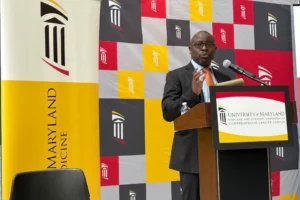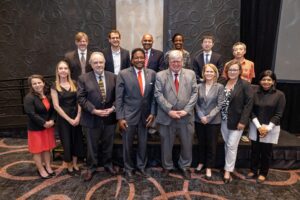University of Maryland Hosts First UM Ventures Symposium on Entrepreneurship
The first symposium on “the notion of entrepreneurship” by the newly formed University of Maryland (UM) Ventures was a breakthrough event for technology collaboration between the Baltimore and College Park campuses, said Jay A. Perman, MD, president of the University of Maryland, Baltimore (UMB).
UM Ventures is a joint effort among the technology transfer offices at the two campuses and the entrepreneurial business services programs at College Park, and is a core initiative of the new collaboration called MPowering the State.
The theme of the symposium, held May 11 at the UM BioPark, was starting a company based on discoveries made by University of Maryland faculty. The event featured more than a dozen entrepreneurial researchers.
“By joining these forces, UM Ventures will stimulate discovery and new business development. And this first symposium gives you a terrific perspective ,” Perman said as he welcomed faculty, venture capitalists, and business men and women to ‘The UMVentures: Symposium on Entrepreneurship, A Tool Kit for Launching a University-Based Startup.’
It was a full day of interaction among expert panelists from corporate perspectives, including CEOs of University of Maryland startup companies, legal fundamentals, and foundations for success by patent attorneys and intellectual property managers, and startup funding resources by public and private financial experts.
“We are not just an academic institution, we are a healthcare institution and the advantages of starting a company are many,” said UMB 2011 Entrepreneur of the Year Scott Strome, MD, FACS,, professor, School of Medicine. Strome co-founded startup Gliknik, Inc. with CEO David Block, MD, MBA, at the BioPark. Starting a company provides fulfillment, opportunities for nontraditional funding, and revenue for the School and the inventor, said Strome, who is chair of the Department of Otorhinolaryngology-Head & Neck Surgery.
The symposium also celebrated an annual 10 percent rate of industrial funding at UMB. Phil Robilotto, DO, MBA, assistant vice president at the UMB Office of Technology Transfer, (pictured) said that with additional human and funding resources, the University has “a real opportunity to increase an impressive list of startups.”
He said, “Faculty come into our office asking how to start a company and run a company. If you think about this, if you spent your life in research, you don’t have any background in this. We put them in touch with the right people to get things going.”



